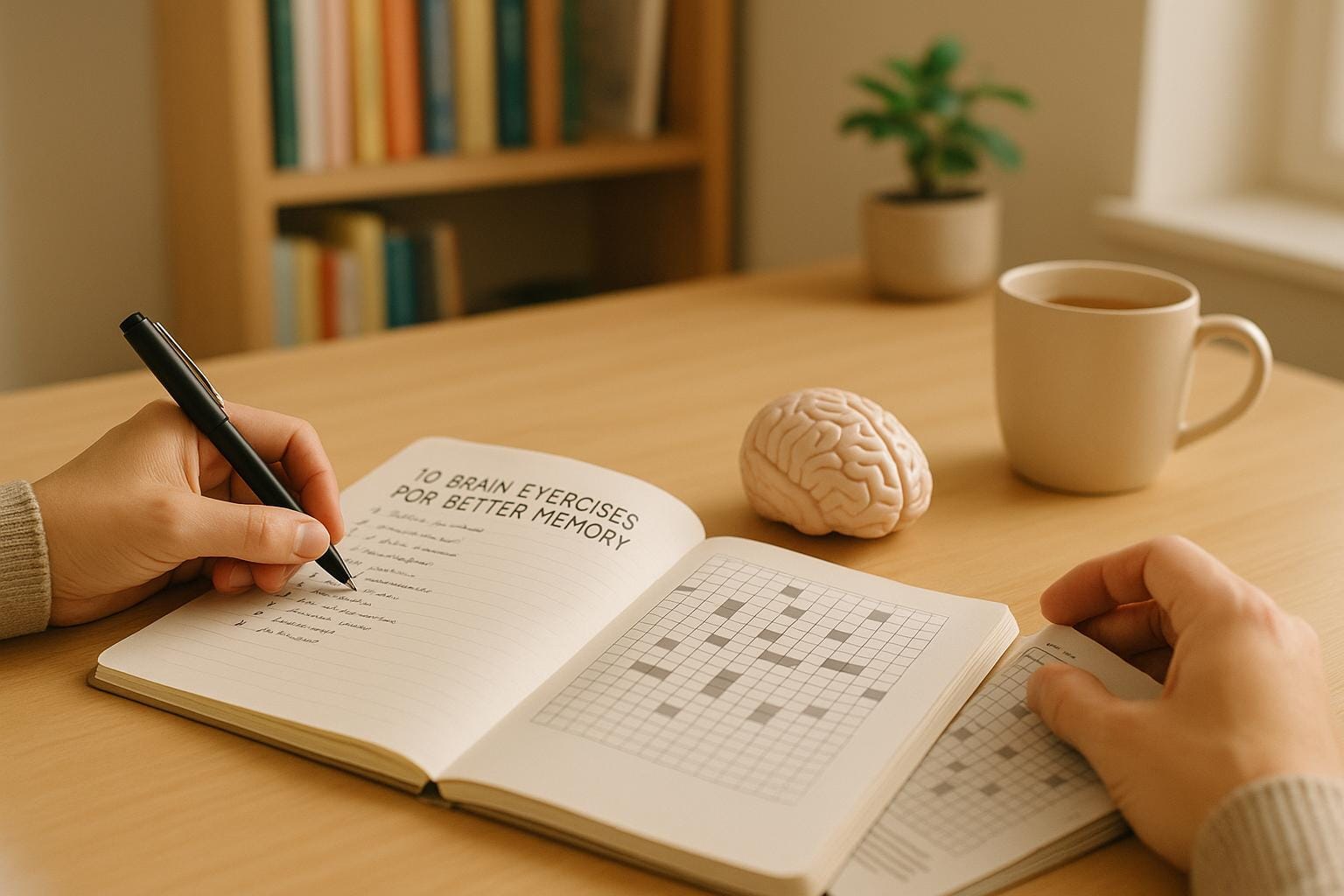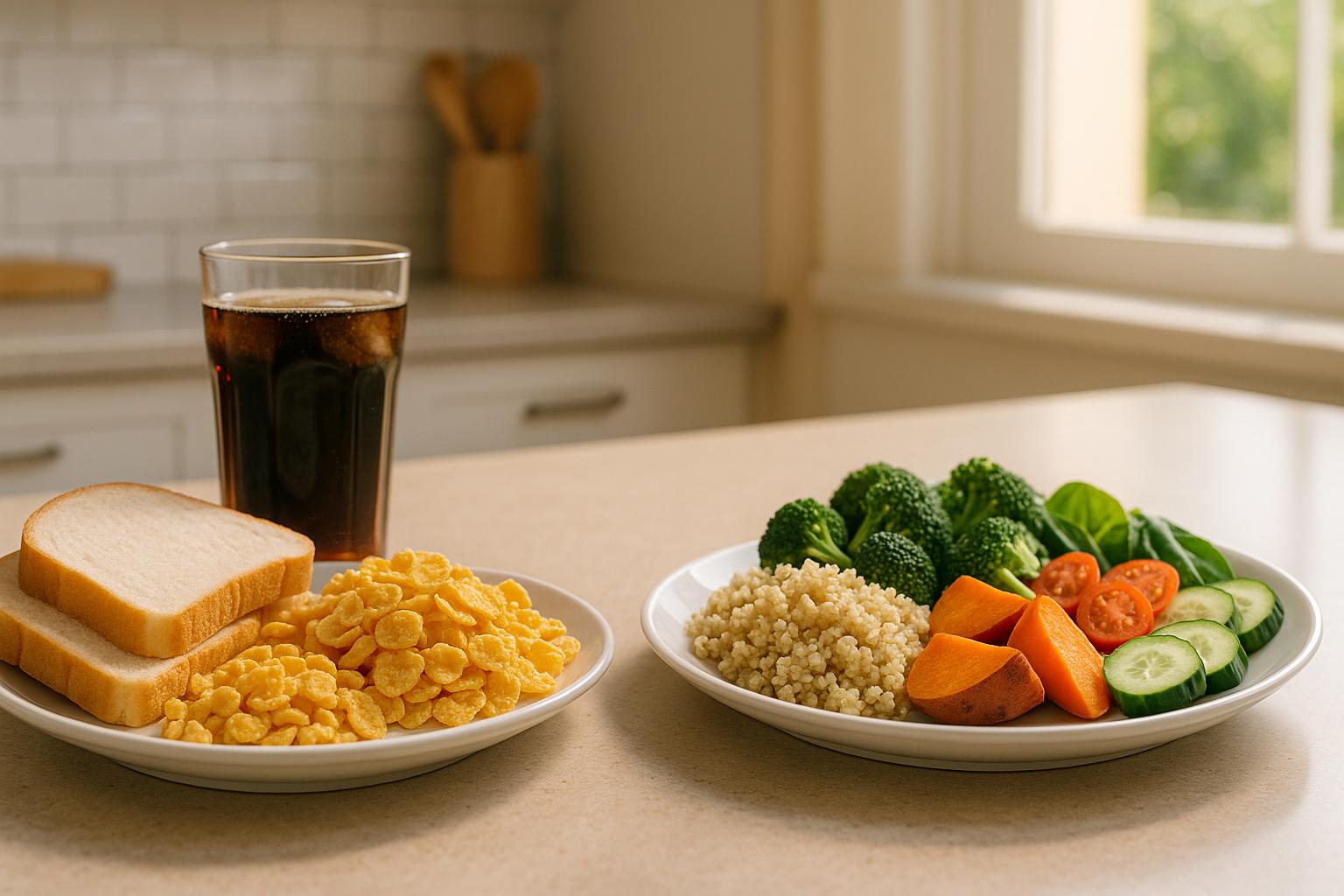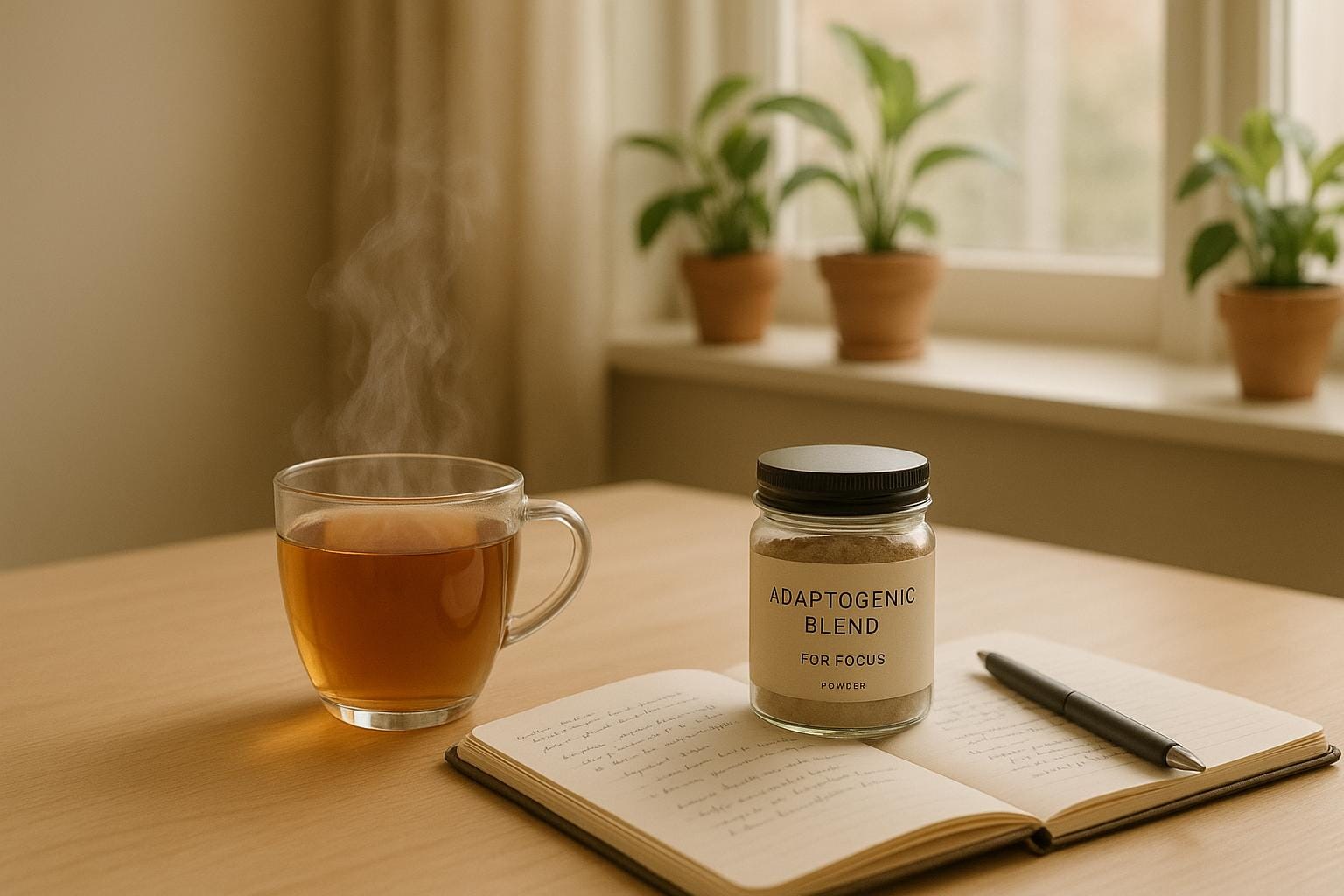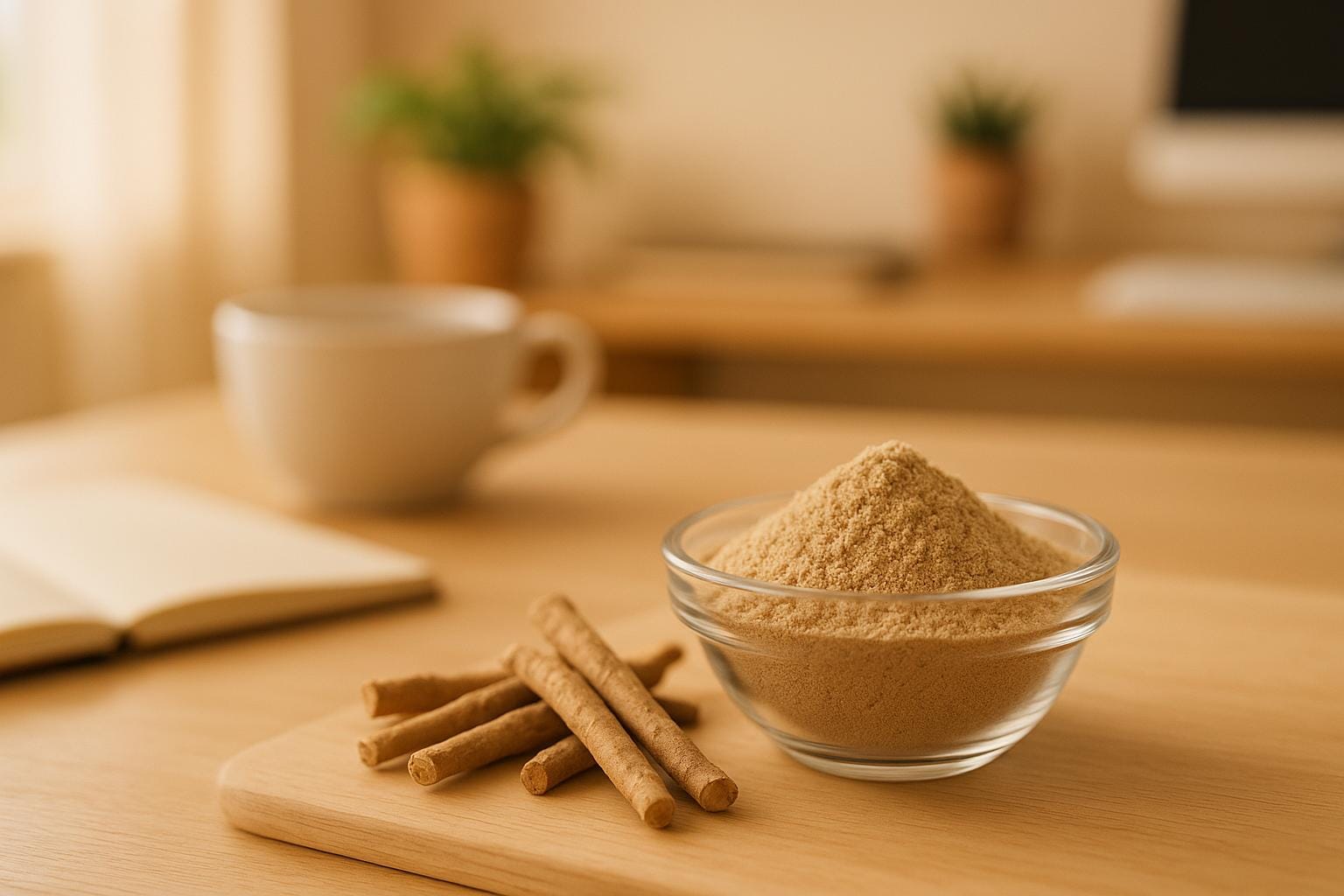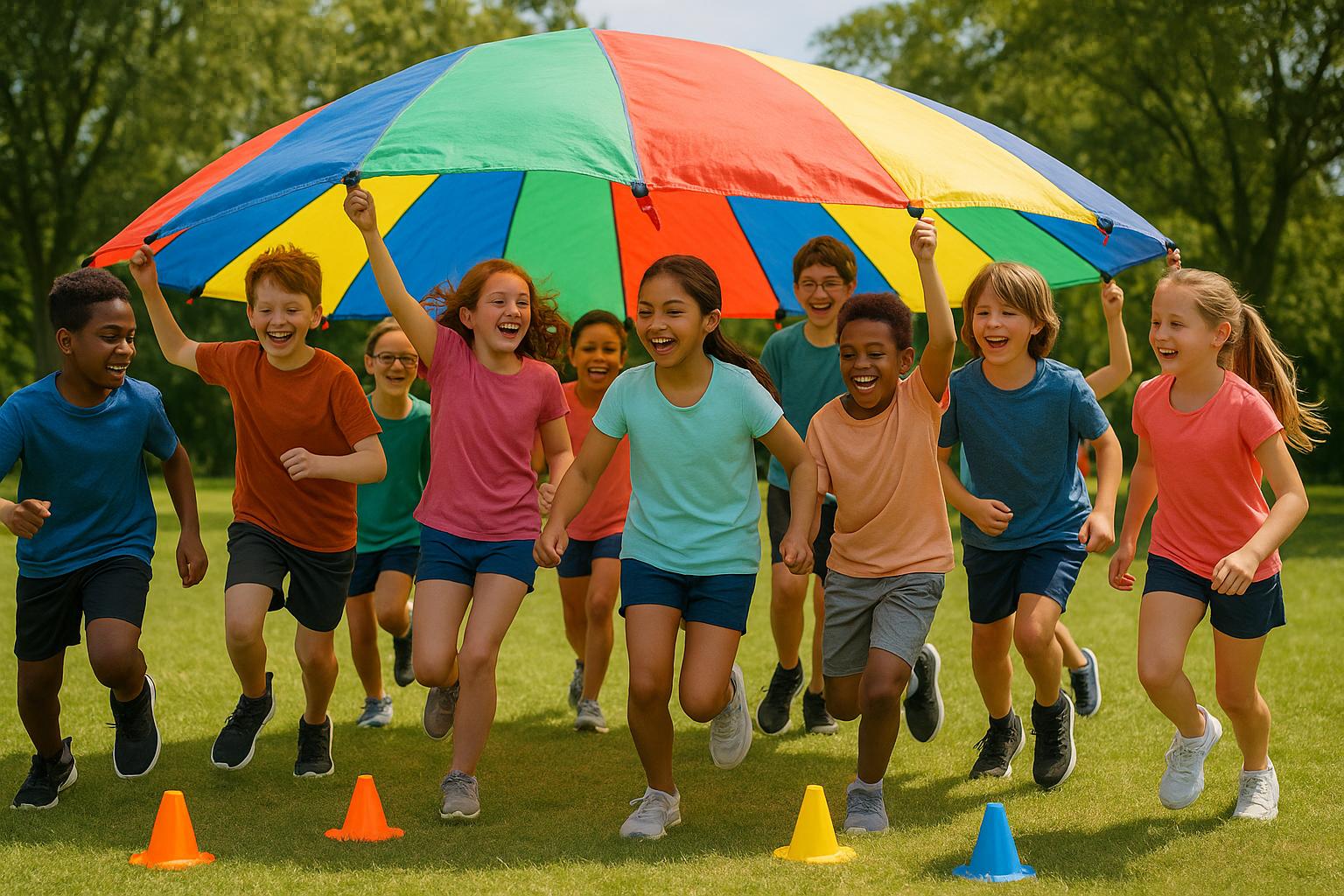Memory is essential for navigating life, but it can decline with age. Fortunately, you can improve it through specific brain exercises. This article outlines 10 effective activities that help boost memory and cognitive function by engaging different parts of the brain. These exercises are backed by research and can be easily incorporated into your daily routine:
- Jigsaw Puzzles: Improves visual-spatial reasoning and working memory.
- Card Games: Enhances pattern recognition and strategic thinking.
- Learning a New Skill: Forms new neural pathways and strengthens memory.
- Memory Games: Sharpens recall and focus.
- Visualization Exercises: Boosts mental imagery and decision-making.
- Meditation and Mindfulness: Reduces stress and improves memory retention.
- Crossword and Word Puzzles: Strengthens vocabulary and critical thinking.
- Board Games: Combines strategy with social interaction for cognitive health.
- Teaching Others: Reinforces knowledge through explanation and retrieval.
- Physical Exercise with Cognitive Elements: Combines movement with mental challenges to enhance brain function.
These activities are simple, accessible, and adaptable to various lifestyles. Consistency is the key to long-term benefits, with noticeable improvements often appearing after several months of regular practice.
Quick Tip: Start small. Pick one or two activities you enjoy and gradually incorporate them into your weekly routine. Even 10–15 minutes a day can make a difference over time.
9 Brain Exercises to Strengthen Your Mind
How Brain Exercises Improve Memory
Brain exercises tap into the brain's incredible ability to adapt, known as neuroplasticity. This process enables the brain to create new neural connections, reinforce existing ones, and reorganize itself when faced with challenges.
Think of brain exercises as workouts for your mind. Just like physical exercise strengthens muscles, mental activities strengthen the neural pathways that support memory. Engaging in complex cognitive tasks can reshape the brain's structure and function on multiple levels. This adaptability forms the foundation for a stronger memory system.
"The more neural connections, the greater the processing speed of the brain... Cognitive training creates an anatomical change in the brain."
– Dr. Manuel Montero-Odasso, MD, PhD, Director of the Gait and Brain Lab, Parkwood Institute
One of the key benefits of brain training is building cognitive reserve - the brain's ability to maintain its functions even as it ages or faces challenges like disease. Studies reveal that people involved in higher education, intellectually demanding jobs, or mentally stimulating activities have a 46% lower risk of developing dementia compared to those with less cognitive engagement.
"It appears that by cognitively challenging yourself, you can expand your cognitive reserve."
– Dr. Shehroo Pudumjee, PhD, Neuropsychologist at Cleveland Clinic Lou Ruvo Center for Brain Health
Neuroplasticity doesn't stop at any particular age. Henry Mahncke, PhD, CEO of Posit Science/BrainHQ, highlights this ongoing adaptability:
"It's now well understood that the brain can rewire itself at any age and in almost any condition... In kids and in younger and older adults, whether with healthy or unhealthy brains, the fundamental way the brain works is by continually rewiring and rebuilding itself, based on what we ask it to do".
To get the most out of brain exercises, variety and consistency are essential. Repeating the same task over and over might make you better at that specific activity, but it won’t necessarily improve your overall cognitive abilities. Rebecca Marcus, LCSW, explains:
"If [you're] playing the same thing over and over again, the mind isn't challenged anymore and begins to run on autopilot".
Focused attention is also critical for improving memory. Activities that demand your full concentration and offer varying levels of difficulty provide the most comprehensive benefits for brain health.
The real-world benefits of brain training are supported by research. In one notable study, participants who underwent speed-of-processing training were 29% less likely to develop dementia over a 10-year period compared to those in the control group. These findings underscore how adaptive changes in the brain can lead to lasting improvements in memory and cognitive function.
The upcoming exercises are designed to target different memory functions, helping you sharpen your mind and strengthen your brain health. Each activity offers a unique way to challenge your cognitive skills and build a stronger mental foundation.
1. Jigsaw Puzzles
Jigsaw puzzles aren’t just a fun pastime - they’re also a fantastic way to keep your brain sharp. By engaging multiple mental processes at once, they provide a solid workout for your mind, helping to strengthen memory and cognitive flexibility.
Cognitive Engagement
When you tackle a jigsaw puzzle, your brain dives into some serious problem-solving. At the forefront is visual-spatial reasoning, which kicks in as you identify shapes, colors, and patterns, and figure out how the pieces fit together. This process forces your brain to analyze details and connect visual elements in meaningful ways.
On top of that, your working memory gets a workout. You’re constantly recalling the shapes, colors, and patterns of pieces while mentally testing where they might fit. It’s like juggling multiple pieces of information at once - literally! This kind of mental engagement lays the groundwork for noticeable memory improvements over time.
Memory Improvement
The benefits of puzzles go beyond just mental engagement. Research backs up their impact on memory. A 2020 study from the University of Waterloo, published in Applied Cognitive Psychology, found that people who regularly solved puzzles showed better short-term memory skills than those who didn’t.
When puzzling, you’re actively remembering details about individual pieces - how they look, where they might belong, and how different sections of the puzzle connect. This constant retention and retrieval of information strengthens memory pathways.
Another study from 2021, featured in the Journal of Experimental Psychology: Human Perception and Performance, highlighted how activities like puzzles can boost executive function and improve attention to detail. These skills naturally spill over into daily life, enhancing your ability to focus and recall information.
Accessibility for Daily Practice
One of the great things about jigsaw puzzles is how easy they are to fit into your life. Whether you’ve got 10-15 minutes during a coffee break or a whole evening to spare, puzzles adapt to your schedule. Unlike many brain-training tools, they don’t require apps, subscriptions, or special equipment.
Puzzles also come in a range of difficulty levels, so you can start simple and gradually take on more challenging designs. Plus, the repetitive nature of piecing together a puzzle can be soothing, making it a great way to unwind and de-stress.
Social or Individual Flexibility
Jigsaw puzzles are wonderfully versatile - they’re just as enjoyable solo as they are in a group. If you’re looking for some quiet time, puzzles can provide a calming, meditative escape. On the flip side, they’re also a great way to connect with others. Working on a puzzle with friends or family sparks conversation, teamwork, and even a bit of creative problem-solving.
Group puzzling can take many forms, from casual family nights to puzzle tournaments with colleagues. Shared activities like these not only strengthen social bonds but also add a layer of fun and collaboration to the experience.
Studies have also shown that puzzles can play a role in long-term cognitive health. Research published in the Journal of Geriatric Psychiatry and Neurology found that older adults who regularly engage in activities like jigsaw puzzles experience slower memory decline compared to those who don’t. This makes puzzles a valuable tool for maintaining mental agility at any age.
This article is for informational purposes only and is not intended as medical advice. Please consult a healthcare professional before starting any new fitness or wellness routine.
2. Card Games
Card games are a fantastic way to sharpen your memory and thinking skills while having fun. They're easy to incorporate into your daily life and serve as an excellent mental workout.
Cognitive Engagement
Playing cards isn’t just about luck - it’s about strategy and quick thinking. Different games challenge your brain in unique ways. For instance, Bridge pushes you to strategize by memorizing bidding sequences and tracking played cards. Gin Rummy enhances your ability to spot patterns as you recall drawn cards and create melds. On the other hand, Texas Hold-Em demands quick calculations of odds by analyzing community cards. These games train your working memory by forcing you to juggle multiple details at once. Over time, this mental exercise can lead to noticeable improvements in memory and cognitive skills.
Memory Improvement
Card games naturally strengthen memory because they require you to recall rules, sequences, and strategies as you play. Research backs this up - a 2003 study found that leisure activities like card games are linked to a lower risk of dementia. Plus, the conversations and strategic discussions that often accompany card games can boost your verbal skills.
Easy to Incorporate into Your Routine
One of the best things about card games is how accessible they are. A standard deck of cards is affordable and doesn’t require any fancy equipment or subscriptions. Whether you have a few minutes for a quick game of Solitaire or want to dive into a longer game like Bridge, card games fit seamlessly into even the busiest schedules.
Solo or Social: Your Choice
Card games are versatile - you can play alone or with others. Solitaire is perfect for solo practice, helping you improve problem-solving and sequence memorization. Playing with others, however, adds a layer of complexity as you adapt to their strategies. Social card games not only challenge your brain but also foster connections, which may help slow cognitive decline. It’s no wonder card games are a popular pastime across the United States.
| Card Game | Cognitive Challenge | Memory Skill |
|---|---|---|
| Bridge | Strategic planning | Memorizing bids |
| Gin Rummy | Pattern recognition | Remembering cards |
| Texas Hold-Em | Probability calculation | Tracking community cards |
| Solitaire | Problem-solving | Sequence memorization |
This article is for informational purposes only and is not intended as medical advice. Please consult a healthcare professional before starting any new fitness or wellness routine.
3. Learning a New Skill
Picking up a new skill isn't just about broadening your abilities - it’s a great way to sharpen memory and boost cognitive function. By introducing your brain to fresh challenges, you can lay the groundwork for exercises that actively enhance memory and mental performance.
Cognitive Engagement
Your brain thrives on variety and challenges. Tackling new tasks forces it to process information differently and build fresh neural connections. Activities that blend problem-solving with creativity - like learning digital photography, quilting, or playing a musical instrument - are especially effective for brain training. These types of challenges encourage neuroplasticity, which helps your brain remain adaptable and responsive as you age.
Memory Improvement
The impact of learning new skills on memory is remarkable. Studies show that older adults who dedicate 16 hours per week over three months to learning new skills outperform their peers on long-term memory tests. In one study, participants experienced such significant improvements in memory and attention that their cognitive abilities mirrored those of people 30 years younger. After a year, their skills even aligned with those of individuals 50 years younger. This approach complements other brain exercises, keeping your cognitive reserve engaged and growing.
Accessibility for Daily Practice
The beauty of learning a new skill is its accessibility. You don’t need fancy tools or memberships to get started. Many options, like reading or exploring a new language, are available through apps, online courses, or local community classes across the United States. Language learning, in particular, is highly effective, as it strengthens connections between different areas of the brain.
Social or Individual Flexibility
Whether you prefer going solo or working in a group, learning new skills fits either approach. Solo learners can explore books, podcasts, audiobooks, videos, or professional development courses at their own pace. On the other hand, group settings offer opportunities for observation, feedback, and shared experiences, which can make learning faster and more engaging. Research shows that people often pick up new skills more effectively through social imitation than by trial and error alone. Plus, group learning adds the benefit of community support and diverse perspectives, which can further accelerate progress. These flexible options make it easy to incorporate skill-building into your daily routine.
This article is for informational purposes only and is not intended as medical advice. Please consult a healthcare professional before starting any new fitness or wellness routine.
4. Memory Games
Memory games are an excellent way to sharpen your brain's ability to store and retrieve information. These games are crafted to boost cognitive functions, enhance concentration, and improve your ability to recall details effectively.
Cognitive Engagement
Memory games do more than entertain - they actively engage your brain in ways that benefit your daily life. By forming new neural pathways, they encourage mental association techniques and improve visual-spatial awareness. This mental workout supports neuroplasticity, helping you build skills like focus, attention, and stress management, which can positively impact various aspects of your life.
The beauty of memory games lies in their accessibility. They offer a fun yet challenging way to stimulate your brain, leading to noticeable improvements in recall and concentration.
Memory Improvement
Regularly playing memory games can help keep your brain sharp as you age. Studies suggest these activities not only enhance short-term memory but also promote overall brain health. Some research even indicates that such games may help protect against dementia in the long run.
These games are especially effective because they target areas of the brain responsible for recognizing patterns and recalling information. With consistent practice, they can enhance your focus, problem-solving skills, and memory retention.
Accessibility for Daily Practice
Getting started with memory games is simple, thanks to the wide range of options available today. Here are a few popular choices:
- Memory Grid by Maple Media: This beginner-friendly game challenges you to remember the positions of green cells on a grid. As you progress, the difficulty increases with more cells and larger grids. It holds a 4.2/5-star rating from over 76,000 users on Google Play.
- Train Your Brain. Memory Games by Senior Games: Featuring classic matching-pair challenges, this app has a stellar 4.5/5-star rating from 124,000 reviews.
- Daily Sudoku: Perfect for number enthusiasts, this game offers various difficulty levels and exercises your short-term memory.
- Wordle by The New York Times: This web-based puzzle gives you six tries to guess a five-letter word, blending memory and problem-solving skills.
With options ranging from apps to simple online games, there's something for everyone.
Social or Individual Flexibility
Memory games are versatile - they work equally well whether you're playing alone or in a group. Solo players can focus on their own pace, using apps to track progress and adjust difficulty levels as they improve. This individualized approach allows you to tailor the experience to your needs.
For those who enjoy social interaction, memory games can easily become group activities. Playing with friends or family adds a layer of fun and fosters connections, which can help combat feelings of isolation or depression. Plus, these games can be adapted to suit different preferences or abilities, whether by simplifying instructions, adding visual aids, or modifying rules to fit the group.
This article is for informational purposes only and is not intended as medical advice. Please consult a healthcare professional before starting any new fitness or wellness routine.
5. Visualization Exercises
Visualization exercises tap into the power of mental imagery to sharpen memory and boost cognitive flexibility. By creating vivid mental pictures, you engage parts of the brain responsible for visual perception, memory storage, and decision-making. This method is a highly effective way to strengthen memory and mental agility.
Cognitive Engagement
When you visualize something, your brain activates the same pathways it uses during actual visual experiences. This includes the occipital lobe for processing visuals, the amygdala for storing memories, and the frontal lobe for decision-making.
Interestingly, the brain processes visual information about 60,000 times faster than text, making visualization an incredibly efficient way to encode and retrieve information. This speed not only helps you form stronger memory connections but also makes recalling details quicker and easier.
"Visualization allows for neuroplasticity to take place; it strengthens connections of motor and cognitive pathways. The more you visualize, the stronger those connections become, leading to improved performance." - Cali Werner, VIS Expert and Licensed Clinical Social Worker
Memory Improvement
Visualization transforms abstract information into vivid mental images, making it easier to remember and recall. Studies reveal that people retain 80% of what they see, compared to just 20% of what they read. By creating multiple pathways for recall, visualization becomes a powerful tool for memory enhancement.
For example, students who use visualization techniques, such as the "mind palace" method, consistently outperform those relying on traditional memorization. This method involves picturing a familiar space and associating specific pieces of information with distinct areas within it, making it easier to retrieve details later.
Easy to Incorporate Into Daily Life
One of the best things about visualization is its simplicity - you don’t need any special tools or equipment. Just a few minutes of focused imagination can make a difference, and you can easily weave it into your daily routine.
- Morning visualization: Spend 2-3 minutes in bed imagining yourself feeling confident and having a productive day. This mental exercise can set a positive tone and improve focus throughout the day.
- Pre-activity visualization: Before a test, presentation, or meeting, visualize yourself staying calm and succeeding. Even for everyday tasks like shopping, picturing your route and items to buy can help you stay organized.
- Bedtime visualization: At night, use calming imagery like walking on a serene beach or watching gentle waves. This practice can help you relax and improve sleep quality.
These simple exercises make visualization a practical and versatile tool for anyone.
A Practice for Everyone, Anywhere
Visualization can be tailored to suit your personal goals, whether you're preparing for a challenge, studying, or working on self-improvement. To make the most of it, engage all your senses - imagine sounds, smells, textures, and even tastes. Adding emotional connections to your visualizations can make them more impactful and memorable.
What’s great is that you can practice visualization anytime, anywhere. Whether you’re commuting, waiting in line, or taking a quick break, you can strengthen your memory and mental clarity with focused imagery.
This article is for informational purposes only and is not intended as medical advice. Please consult a healthcare professional before starting any new fitness or wellness routine.
6. Meditation and Mindfulness
Meditation and mindfulness offer an effective way to improve memory by promoting changes in the brain. Studies show that these practices encourage neuroplasticity, which supports hippocampal growth and increases grey matter in areas vital for attention and memory. These physical changes in the brain create a foundation for meditation's ability to enhance daily cognitive performance.
Cognitive Engagement
Meditation helps train your focus by directing attention to a specific target, such as your breath or a mantra. This practice improves concentration and reduces distractions, which directly benefits working memory. With better focus, you're able to retain more information during daily activities.
"Meditation is a technique that involves focusing your attention on a specific activity, for example, on breath, an object, such as a candle, or a thought, like a mantra. The idea is to train your mind to be more aware, present, and calm. Through regular meditation practice, you can improve your attention span and memory, among other cognitive abilities." – Jacqui Delgado, MS, CCC-SLP
Memory Improvement
Even short, daily meditation sessions have been shown to enhance attention, working memory, and recognition memory. Mindfulness, in particular, can improve short-term memory by reducing proactive interference - when older memories make it harder to learn new information. An 8-week Mindfulness-Based Stress Reduction (MBSR) program, for instance, increased grey matter density in the left hippocampus, a region critical for memory. Another study revealed that MBSR participants maintained their focus and working memory even under stress. Additionally, mindfulness meditation can lower cortisol levels - a stress hormone that, when elevated, can harm memory and shrink the hippocampus.
"When you try to learn something new, it's difficult to do it because you have all these past memories that interfere. It makes a lot of sense that mindfulness might improve that, because the tendency to attend to the present moment is a core concept of mindfulness." – Jonathan Greenberg, Lead Author of the study
Accessibility for Daily Practice
Meditation is both simple and adaptable. Starting with just 5 minutes of guided meditation can make a difference, and apps like Insight Timer, Calm, or Ten Percent Happier Meditation make it easy to begin. Over time, you can extend your sessions to 20–30 minutes. Techniques like mindful breathing or the Three-Minute Breathing Space are quick and easy to incorporate into your daily routine. Movement-based mindfulness practices, such as mindful walking (paying attention to the sensation of your feet touching the ground) and mindful eating (focusing on textures, colors, and smells), provide additional ways to stay engaged throughout the day.
Social and Individual Flexibility
Meditation fits seamlessly into both individual and group settings. Practicing alone allows you to tailor your sessions to your schedule and preferences, while group meditation offers the added benefit of community support, which can help you stay consistent. Whether done solo or with others, regular meditation improves memory, focus, and overall mood. Its flexibility makes it a practical and effective tool for enhancing cognitive function.
This article is for informational purposes only and is not intended as medical advice. Please consult a healthcare professional before starting any new fitness or wellness routine.
7. Crossword and Word Puzzles
Crossword and word puzzles do more than just entertain - they actively support memory by forming new neural pathways and strengthening existing ones, which are key for retaining information.
Cognitive Engagement
Crossword puzzles are like a full-body workout for your brain. They tap into a variety of mental skills, including vocabulary, pattern recognition, and problem-solving. This combination of activities activates multiple brain regions, improving mental speed and short-term memory. Plus, they sharpen visual and spatial reasoning while enhancing critical and analytical thinking skills.
The process of solving a crossword - recalling words, interpreting clues, and fitting answers into a grid - stimulates the hippocampus and cortex. These areas are vital for forming and retrieving memories.
"Crossword puzzles are more than just a game. They can support healthy brain function and can help improve your memory." - Link Neuroscience Institute
Memory Improvement
Science backs up the memory-boosting power of crosswords. A study in the New England Journal of Medicine revealed that 37.3% of participants who tackled electronic crossword puzzles improved their scores by two or more points on the Alzheimer's Disease Assessment Scale-Cognitive (ADAS-Cog). Similarly, Harvard Health Publishing noted that solving online crosswords led to 0.5% to 1% less shrinkage in the hippocampus and cortex over 18 months compared to other online brain games.
Regularly solving crosswords might even delay the onset of dementia by about two and a half years. These puzzles are a simple yet effective way to maintain cognitive sharpness as you age.
Accessibility for Daily Practice
Crosswords are easy to fit into a busy lifestyle. Mini crosswords, for instance, are designed to offer just the right level of challenge without taking up too much time. Online versions make them even more convenient - you can solve them anywhere without needing a pencil or eraser.
"Solve bite-sized crossword puzzles designed to fit into your busy schedule. These daily mini crosswords provide just the right amount of challenge to keep your brain engaged without overwhelming you." - Mini Crossword Overview
For the best results, aim for four sessions a week, spending about 30 minutes per session. Choose puzzles that are moderately challenging to keep your brain engaged without causing frustration.
Social and Individual Flexibility
One of the great things about crossword puzzles is their flexibility. Solving them solo provides a focused mental workout and a satisfying sense of achievement. On the other hand, tackling puzzles with friends or family adds a social element. Working together encourages collaboration, sparks new ideas, and strengthens brain connections, all while boosting emotional well-being.
Whether you prefer solving crosswords alone or with others, they’re a practical and enjoyable way to support memory and cognitive health. Adding them to your routine can complement other brain-boosting activities, helping you build a strong defense against cognitive decline.
This article is for informational purposes only and is not intended as medical advice. Please consult a healthcare professional before starting any new fitness or wellness routine.
8. Board Games
Board games are more than just a source of entertainment - they’re an engaging way to sharpen your memory and keep your mind active. Unlike solitary brain exercises, board games combine mental challenges with social interaction, offering a unique blend of cognitive stimulation and emotional well-being.
Cognitive Engagement
Playing board games is like giving your brain a full workout. They require you to focus, think strategically, and recall information - all at the same time. Whether it’s remembering the rules, tracking the game’s progress, or adjusting your strategy, these activities strengthen neural pathways and build what’s called cognitive reserve - your brain’s ability to adapt and find alternative solutions.
Different games focus on specific mental skills. For instance:
- Chess hones strategizing and pattern recognition, which can enhance memory and even improve IQ.
- Scrabble stimulates word recall and critical thinking.
- Monopoly challenges your math skills while engaging memory and perception.
A study from the University of Calgary even found that regular Scrabble players activate brain regions linked to working memory and visual processing. This shows how board games can target various areas of the brain, encouraging better cognitive performance over time.
Memory Improvement
Research highlights the memory-boosting benefits of board games - players are 15% less likely to develop dementia. Specific games offer targeted benefits, as shown below:
| Board Game | Memory Benefit |
|---|---|
| Memory Game | Boosts short-term memory, focus, and concentration |
| Chess | Enhances memory, focus, and problem-solving skills |
| Scrabble | Improves vocabulary, memory, and critical thinking |
| Set | Strengthens visual memory and attention to detail |
| Clue | Sharpens logical thinking, especially in older adults |
A study from the University of California/Berkeley found that seniors who engaged in logic-based games had fewer beta-amyloid deposits in their brains - a protein linked to Alzheimer’s disease. Additionally, older adults who regularly played chess were less likely to develop dementia, even after age 75.
Accessibility for Daily Practice
The beauty of board games lies in their simplicity and accessibility. Most games can be played in 30–60 minutes, fitting easily into daily routines. They’re an enjoyable alternative to traditional brain exercises, making it easier to stay consistent.
"Engaging in memory games regularly helps improve memory, attention to detail, and problem-solving skills." - Dr. Lozynska Liudmyla Yaroslavivna, Psychiatry & Psychotherapy
Start with simpler games and gradually move to more challenging ones. Games like Qwirkle focus on pattern recognition and basic math, while Enchanted Forest offers a memory challenge with numerous items to recall. Regular play is key - consistent engagement with board games can significantly improve memory and focus over time.
Social and Individual Flexibility
Board games offer a perfect mix of cognitive and social benefits. When played with others, they encourage communication, negotiation, and teamwork, all while keeping your brain engaged. This social aspect is especially important, as research shows board game players experience lower rates of depression compared to non-players.
Whether you’re playing solo to refine your strategy or with friends and family for some quality time, board games are a versatile way to stay mentally sharp. To maximize their benefits, try a variety of games to challenge different cognitive skills. Set small, achievable goals for each session to stay motivated, and make sure you’re well-rested and hydrated before diving in.
Incorporate a mix of board games into your routine alongside other brain-boosting activities to keep your memory sharp and your mind engaged.
This article is for informational purposes only and is not intended as medical advice. Please consult a healthcare professional before starting any new fitness or wellness routine.
9. Teaching Others
Teaching others isn't just about sharing knowledge - it's also a fantastic way to give your brain a workout. When you teach, you’re forced to organize your thoughts, clarify complex ideas, and identify gaps in your understanding. This process, often called the protégé effect, strengthens your memory by engaging skills like retrieval, organization, and communication. In essence, teaching becomes a two-way street: you help someone else learn while deepening your own understanding.
Memory Boosting Benefits
One of the key perks of teaching is how it reinforces memory. By actively retrieving and explaining information, you expose yourself to repeated practice, which is crucial for long-term retention. Studies suggest that encountering new information 5 to 7 times is essential for committing it to memory. Teaching goes beyond rote repetition - it encourages you to find practical applications for theoretical knowledge, making what you’ve learned stick more effectively.
Easy Ways to Make It Part of Your Day
Incorporating teaching into your daily life doesn’t have to be complicated. Try explaining a new concept to a friend or summarizing material as though you’re preparing a lesson. Informal settings like study groups, online forums, or even volunteer tutoring can be excellent opportunities to strengthen your understanding while helping others. These small, consistent efforts can lead to big cognitive rewards.
A Fit for Any Style
Whether you thrive in social settings or prefer working solo, teaching offers options to match your style. If you enjoy interacting with others, you could lead group discussions, host workshops, or get involved in community education programs. Interestingly, research shows that regular social engagement can help lower the risk of cognitive decline. Prefer a more independent approach? Writing blog posts or creating video tutorials can be just as effective. Tailoring your communication to different audiences not only keeps your brain sharp but also challenges you to think creatively.
Teaching creates a feedback loop that benefits both the teacher and the learner. It’s an interactive way to strengthen your brain while connecting with others - or even just challenging yourself.
This article is for informational purposes only and is not intended as medical advice. Please consult a healthcare professional before starting any new fitness or wellness routine.
10. Physical Exercise with Cognitive Elements
Combining physical activity with mental challenges creates a powerful recipe for boosting brain health. Activities like dancing, tai chi, and sports not only get your heart pumping but also engage your brain with tasks like coordination, planning, and quick decision-making. This blend strengthens both your body and mind, making it an excellent way to support memory and overall cognitive function.
Cognitive Engagement
Physical activities that demand mental focus can lead to improved brain connectivity. Take dancing, for instance - it mixes rhythm, music, and movement while requiring you to remember steps and coordinate complex sequences. Similarly, sports call for sustained focus, strategic planning, and the ability to adapt quickly to changing scenarios. Tai chi offers a unique approach, combining slow, deliberate movements with rhythmic breathing and meditation. Research has shown that tai chi practitioners experience better connectivity between brain regions, which may help improve cognitive function and slow memory decline.
A 2022 meta-analysis even highlighted the benefits of dancing for older adults with mild cognitive impairment, showing improvements in global cognition, memory, cognitive flexibility, visuospatial skills, and balance. These activities enhance neural pathways, creating a strong foundation for better memory performance.
Memory Improvement
Physical and cognitive exercises together can also enhance memory. Studies back this up: one study involving 165 older adults (ages 59 to 81) found that higher fitness levels were linked to a larger bilateral hippocampus, a brain area crucial for memory, and better spatial memory performance. Another trial with 120 older adults reported a 2% increase in hippocampal volume, improved spatial memory, and higher levels of brain-derived neurotrophic factor (BDNF), a protein associated with brain health.
Easy to Incorporate Into Daily Life
You don’t need fancy equipment or a gym membership to include cognitive-physical exercises in your daily routine. Small changes, like using the stairs or taking short walking breaks, can make a difference. Aim for at least 150 minutes of moderate-intensity exercise per week, breaking it into manageable sessions. Start small - just a few minutes a day - and gradually add 5 to 10 minutes each week until you reach your goal.
Suited for Social or Solo Practice
These activities are flexible enough to fit into both group and solo settings. Dancing can be done in a lively class or through online tutorials at home. Sports naturally encourage social interaction, which itself may help reduce the risk of cognitive decline. Tai chi works well in a group setting, like a local park, or as a quiet, meditative practice in your living room. Whether you’re walking your dog or learning a new dance routine, consistency is key. Over time, regular physical and cognitive activity can sharpen your mental clarity, boost your mood, and improve overall brain function.
This article is for informational purposes only and is not intended as medical advice. Please consult a healthcare professional before starting any new fitness or wellness routine.
Comparison Table
Below is a breakdown of various brain exercises and the cognitive benefits they offer to bolster memory and mental sharpness.
| Exercise | Main Cognitive Gains |
|---|---|
| Jigsaw Puzzles | Engages perception, mental rotation, working memory, and reasoning |
| Card Games | Develops thinking skills like self-control and task-switching |
| Learning a New Skill | Boosts memory and strengthens neural connections |
| Memory Games | Enhances cognitive performance, particularly in older adults |
| Visualization Exercises | Aids in organizing information and making decisions |
| Meditation and Mindfulness | Reduces stress, sharpens memory, and improves information processing |
| Crossword Puzzles | Supports cognitive function in individuals with mild cognitive impairment |
| Board Games | Helps slow cognitive decline in aging adults |
| Teaching Others | Deepens understanding by explaining concepts and addressing errors |
| Physical Exercise with Cognitive Elements | Enhances brain function and may delay conditions like dementia |
These exercises provide a foundation for targeted mental training. Research underscores the power of variety in brain workouts. For instance, a 2016 UCLA study revealed that combining meditative yoga with daily meditation significantly improved verbal and visual-spatial memory. Likewise, older adults who took on multiple new skills - such as learning a language, drawing, or playing music - showed cognitive abilities on par with younger individuals. By choosing activities that match your interests and lifestyle, you can maximize long-term mental benefits.
"It's never too late to begin." - Kaitlin Casaletto, Assistant Professor of Neuropsychology at the University of California, San Francisco Memory and Aging Center
The key to lasting cognitive improvement lies in consistent practice.
This article is for informational purposes only and does not substitute for medical advice. Always consult a healthcare professional before starting a new fitness or wellness routine.
Conclusion
Brain exercises are a simple and effective way to keep your mind sharp and help reduce the risk of cognitive decline. Research highlights that adults who stay physically active are nearly twice as likely to maintain their cognitive health compared to those who are inactive. Considering that 15%–20% of adults over 65 in the U.S. experience mild cognitive impairment, taking steps to support your brain health is more important than ever.
The best part? There’s something for everyone. Whether you enjoy solving crossword puzzles, playing card games with friends, or practicing tai chi, you can choose activities that align with your interests and fit seamlessly into your lifestyle.
"Choose whatever aerobic or resistance activity you enjoy. The most important thing is that you're getting up and moving on a regular basis".
Consistency is the secret to success.
Starting small can set the foundation for long-term benefits.
"Aim for a goal of exercising at a moderate intensity - such as brisk walking - for 150 minutes per week. Start with a few minutes a day and increase the amount by five or 10 minutes every week until you reach your goal".
It’s worth noting that the cognitive benefits of exercise often become noticeable after about six months of regular activity. But even a single session of moderate-to-vigorous physical activity can have immediate positive effects on brain health.
The key is to combine enjoyment with consistency.
"In terms of improving brain function, any exercise is better than none... However, to experience the greatest benefits, consistency is key".
Incorporate brain-boosting activities into your daily routine by pairing them with things you already love. Over time, these small, consistent changes can lead to significant benefits. With dementia diagnoses occurring globally every four seconds and projections estimating over 115 million people worldwide will be affected by dementia by 2050, prioritizing brain health today can help ensure a sharper, more resilient tomorrow.
Each step you take, each puzzle you solve, and every new habit you build not only strengthens your memory but also contributes to a healthier, more balanced lifestyle.
This article is for informational purposes only and is not intended as medical advice. Please consult a healthcare professional before starting any new fitness or wellness routine.
FAQs
How long does it take to see improvements in memory with brain exercises?
Noticeable changes in memory often require about six months of regularly practicing brain exercises or engaging in mental activities. On the other hand, short-term benefits, such as sharper focus or improved memory recall, can show up within 24 hours of doing certain exercises.
To achieve lasting effects, consistency is key - make these exercises a regular part of your daily routine.
What are some easy brain exercises for beginners to boost memory?
If you're new to brain exercises, there are plenty of easy ways to give your memory a boost. Activities like crossword puzzles and Sudoku are fantastic for sharpening problem-solving skills while giving your memory a workout. Memory games, such as matching pairs or recalling sequences, are another fun and effective option to get started. You might also want to try mindfulness meditation - it helps enhance focus and lower stress, both of which play a big role in memory retention. The best part? These exercises fit seamlessly into your daily routine, making it simple to kickstart your journey toward better cognitive health.
Can brain exercises help reduce the risk of dementia or slow its progression?
While brain exercises can’t completely prevent dementia, they might help delay its onset and support overall cognitive health. Engaging in activities such as puzzles, memory games, or problem-solving tasks can boost mental agility and enhance memory, especially in older adults.
What’s more, pairing these mental exercises with regular physical activity can make a big difference. Research suggests this combination could lower the risk of dementia by 20–28%. Staying both mentally and physically active offers a practical way to promote brain health as you grow older.


